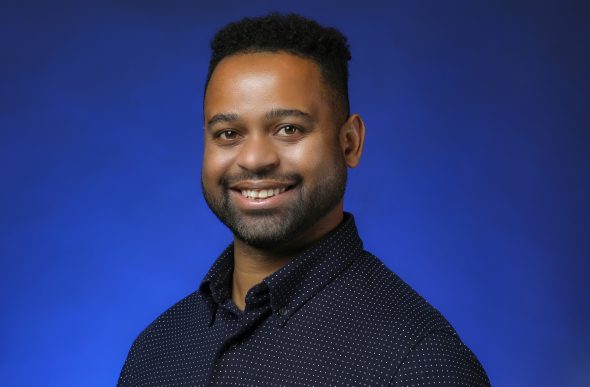UIC leads national consortium educating next generation of quantum engineers
Harnessing the potential of quantum physics for advances in computing, communication and other technologies promises to be the next great engineering challenge. A new consortium of seven U.S. academic institutions, funded by the Department of Energy and led by University of Illinois Chicago, will pave educational pathways to usher students from all backgrounds into this revolutionary field.
The $4.8 million, three-year award, funded through the DOE RENEW Initiative, will establish the ReACT-QISE Consortium, made up of Historically Black Colleges and Universities, Hispanic-Serving Institutions and institutions serving predominantly female students. The initiative will be led by Thomas A. Searles, associate professor of electrical and computer engineering at UIC, with colleagues Zizwe Chase and Daniela Tuninetti.
En español

“The realization of advanced quantum technologies requires a skilled, diverse workforce to bring ideas central to quantum information to real-world application outside of the laboratory,” Searles said. “We formed this consortium based on my experience as the director of IBM-HBCU Quantum Center, which is meant to increase participation in quantum computing with a focus on quantum information science. In our new consortium, we plan to build, support and connect a diverse population of students to create a new generation of quantum engineers trained in advanced computing and communications technologies.”
In addition to UIC, the ReACT-QISE Consortium includes Spelman College, Tulane University, Southern University and A&M College, Rensselaer Polytechnic Institute, Arizona State University and Morehouse College.
Representatives from each institution will collaboratively construct an undergraduate curriculum and educational materials for quantum engineering, introducing students early in their post-secondary education to key concepts in physics, computer science, theory and other essential areas. Individual institutions will then adapt these shared resources for the needs of their own students and faculty, building new degree programs and research experiences.
“Across the country, there are currently very few courses for quantum engineering at the undergraduate level,” said Tuninetti, professor and department head of electrical and computer engineering. “The challenge is that not many freshmen come in knowing quantum mechanics. We need to put our brains together and figure out how we introduce this material, what are the prerequisites and what is the progression of knowledge and content from one course to another.”
At UIC, the initiative will support the creation of a new quantum engineering track under the engineering physics major in the electrical and computer engineering department, as well as a new Master of Science in quantum engineering. In support of these programs, UIC faculty will develop new courses, quantum-focused modules that plug into existing ECE courses and a new quantum laboratory space for student research projects.
By emerging from and focusing on public and minority-serving academic institutions, the ReACT-QISE Consortium will also provide pathways into the quantum workforce for groups traditionally underrepresented in STEM fields.
“In order for this university and country to compete on the world stage, it is paramount that we encourage people of all backgrounds and identities to learn about and participate in this exciting and growing science,” said Chase, assistant professor of electrical and computer engineering. “We want to be at the forefront of preparing the youth for the plethora of quantum related jobs that will be available and train the next generation of quantum engineers.”
